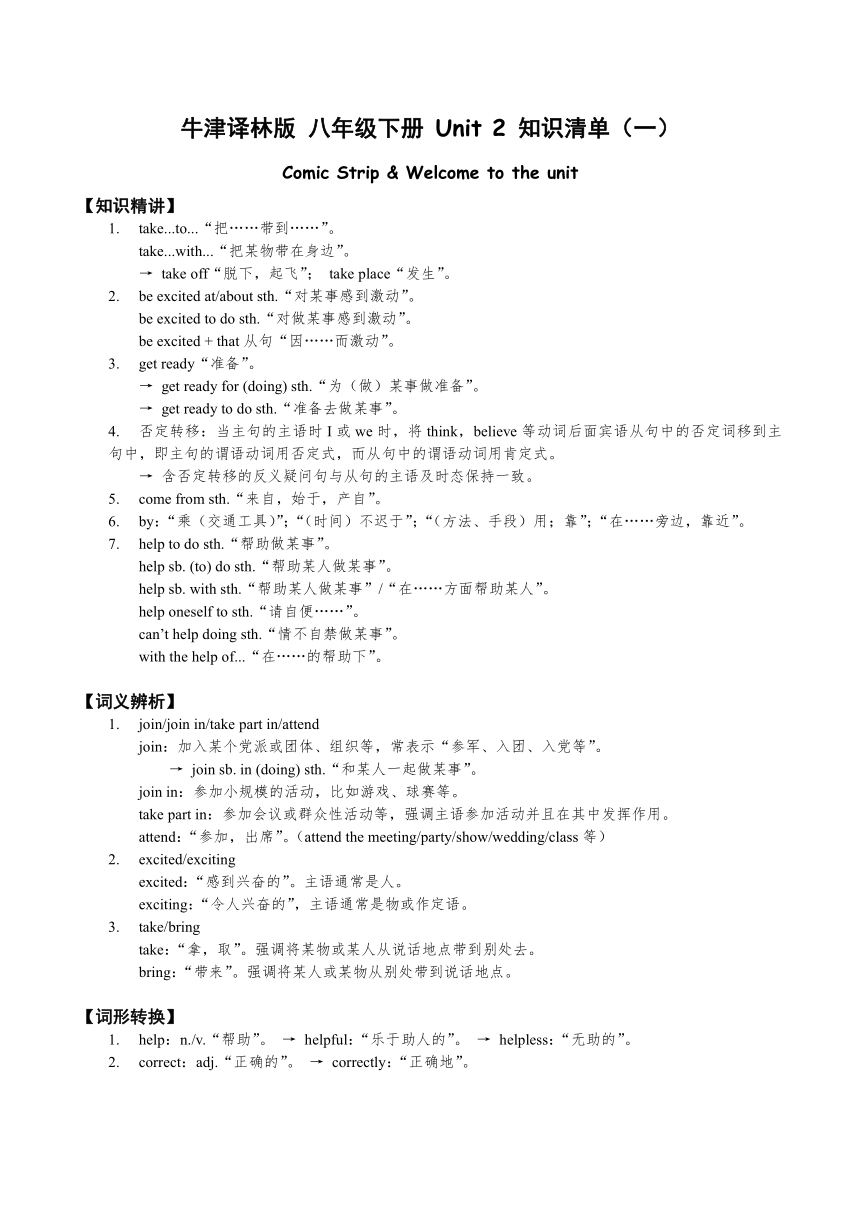Unit 2 Travelling知识清单及练习(含答案)牛津译林版英语八年级下册
文档属性
| 名称 | Unit 2 Travelling知识清单及练习(含答案)牛津译林版英语八年级下册 |

|
|
| 格式 | docx | ||
| 文件大小 | 21.0KB | ||
| 资源类型 | 教案 | ||
| 版本资源 | 牛津译林版 | ||
| 科目 | 英语 | ||
| 更新时间 | 2024-06-23 15:50:08 | ||
图片预览


文档简介
牛津译林版 八年级下册 Unit 2 知识清单(一)
Comic Strip & Welcome to the unit
【知识精讲】
take...to...“把……带到……”。
take...with...“把某物带在身边”。
→ take off“脱下,起飞”; take place“发生”。
be excited at/about sth.“对某事感到激动”。
be excited to do sth.“对做某事感到激动”。
be excited + that从句“因……而激动”。
get ready“准备”。
→ get ready for (doing) sth.“为(做)某事做准备”。
→ get ready to do sth.“准备去做某事”。
否定转移:当主句的主语时I或we时,将think,believe等动词后面宾语从句中的否定词移到主句中,即主句的谓语动词用否定式,而从句中的谓语动词用肯定式。
→ 含否定转移的反义疑问句与从句的主语及时态保持一致。
come from sth.“来自,始于,产自”。
by:“乘(交通工具)”;“(时间)不迟于”;“(方法、手段)用;靠”;“在……旁边,靠近”。
help to do sth.“帮助做某事”。
help sb. (to) do sth.“帮助某人做某事”。
help sb. with sth.“帮助某人做某事”/“在……方面帮助某人”。
help oneself to sth.“请自便……”。
can’t help doing sth.“情不自禁做某事”。
with the help of...“在……的帮助下”。
【词义辨析】
join/join in/take part in/attend
join:加入某个党派或团体、组织等,常表示“参军、入团、入党等”。
→ join sb. in (doing) sth.“和某人一起做某事”。
join in:参加小规模的活动,比如游戏、球赛等。
take part in:参加会议或群众性活动等,强调主语参加活动并且在其中发挥作用。
attend:“参加,出席”。(attend the meeting/party/show/wedding/class等)
excited/exciting
excited:“感到兴奋的”。主语通常是人。
exciting:“令人兴奋的”,主语通常是物或作定语。
take/bring
take:“拿,取”。强调将某物或某人从说话地点带到别处去。
bring:“带来”。强调将某人或某物从别处带到说话地点。
【词形转换】
help:n./v.“帮助”。 → helpful:“乐于助人的”。 → helpless:“无助的”。
correct:adj.“正确的”。 → correctly:“正确地”。
【短语归纳】
be going to South Hill 打算去南山
for my holiday 度假
join you 加入你
get ready 准备一下
get all my things 收拾我所有的东西
take the bag 拿着包
be on holiday 度假
want to find out more about different places 想更多地了解不同的地方
places of interest 名胜
the Great Wall 长城
the Leaning Tower of Pisa 比萨斜塔
the Little Mermaid 小美人鱼
the Statue of Liberty 自由女神像
the Sydney Opera House 悉尼歌剧院
Tower Bridge 塔桥
in Copenhagen 在哥本哈根
the capital of Denmark 丹麦的首都
come from 来自
the story by Hans Christian Andersen 汉斯·克里斯蒂安·安徒生写的故事
【重点句型】
Where are you going
你要去哪里?
I’m going to South Hill for my holiday.
我要去南山度假。
I’ve been there before.
我从前去过那里。
Can I join you
我能和你一起吗?
Get ready!
准备吧!
What are you doing, Hobo
你在做什么,霍波?
I’m getting all my things.
我要带上我所有的东西。
Take the bag, Eddie.
埃迪,带着包。
I don’t think it’ll be a holiday for me.
我认为这对我来说不是一个假期。
Where have you been on holiday
你去哪里度假了?
The Class 1, Grade 8 students want to find out more about different places.
八年级一班的学生想更多地了解不同的地方。
Daniel and Millie are looking at some pictures of places of interest from around the world.
丹尼尔和米莉正在看一些世界各地的名胜的图片。
What’s this, Millie
米莉,这是什么?
It’s the Little Mermaid.
它是小美人鱼。
Where is it
它在哪里?
It’s in Copenhagen, the capital of Denmark.
它在丹麦的首都哥本哈根。
What’s special about it
它有什么特别之处?
It comes from the story by Hans Christian Andersen.
它来自汉斯·克里斯蒂安·安徒生写的故事。
—Have you ever been there —No, I haven’t.
——你曾经去过那里吗? ——不,我没有去过。
【针对训练】
根据汉语提示完成句子。
__________(旅行)abroad is very interesting. Traveling
单项选择。
I have never been so __________and that is __________ moment in my life.
A.excited; an exciting B.exciting; an excited
C.excited; the most exciting D.exciting; the most excited
I __________ the school football team two years ago. I __________ the team for two years.
A.have joined; have been in B.joined; have been in
C.joined; was in D.joined in; have join
__________ the help of modern technology, scientists got a photo of a black hole.
A.At B.With C.In D.On
翻译句子。
我们自从加入同一个俱乐部就成为了好朋友。
We ________ ________ good friends since we ________ the same club. have been; joined
我认为他们不能使一切准备得足够好。
__________________________________________________________________________
I don’t think they can make everything good enough.
—小美人鱼有什么特别吗?
—它来自安徒生写的故事。
—________ ________ about the Little Mermaid What’s special
—It ________ ________ ________ ________ ________ Andersen. comes from the story by
Comic Strip & Welcome to the unit
【知识精讲】
take...to...“把……带到……”。
take...with...“把某物带在身边”。
→ take off“脱下,起飞”; take place“发生”。
be excited at/about sth.“对某事感到激动”。
be excited to do sth.“对做某事感到激动”。
be excited + that从句“因……而激动”。
get ready“准备”。
→ get ready for (doing) sth.“为(做)某事做准备”。
→ get ready to do sth.“准备去做某事”。
否定转移:当主句的主语时I或we时,将think,believe等动词后面宾语从句中的否定词移到主句中,即主句的谓语动词用否定式,而从句中的谓语动词用肯定式。
→ 含否定转移的反义疑问句与从句的主语及时态保持一致。
come from sth.“来自,始于,产自”。
by:“乘(交通工具)”;“(时间)不迟于”;“(方法、手段)用;靠”;“在……旁边,靠近”。
help to do sth.“帮助做某事”。
help sb. (to) do sth.“帮助某人做某事”。
help sb. with sth.“帮助某人做某事”/“在……方面帮助某人”。
help oneself to sth.“请自便……”。
can’t help doing sth.“情不自禁做某事”。
with the help of...“在……的帮助下”。
【词义辨析】
join/join in/take part in/attend
join:加入某个党派或团体、组织等,常表示“参军、入团、入党等”。
→ join sb. in (doing) sth.“和某人一起做某事”。
join in:参加小规模的活动,比如游戏、球赛等。
take part in:参加会议或群众性活动等,强调主语参加活动并且在其中发挥作用。
attend:“参加,出席”。(attend the meeting/party/show/wedding/class等)
excited/exciting
excited:“感到兴奋的”。主语通常是人。
exciting:“令人兴奋的”,主语通常是物或作定语。
take/bring
take:“拿,取”。强调将某物或某人从说话地点带到别处去。
bring:“带来”。强调将某人或某物从别处带到说话地点。
【词形转换】
help:n./v.“帮助”。 → helpful:“乐于助人的”。 → helpless:“无助的”。
correct:adj.“正确的”。 → correctly:“正确地”。
【短语归纳】
be going to South Hill 打算去南山
for my holiday 度假
join you 加入你
get ready 准备一下
get all my things 收拾我所有的东西
take the bag 拿着包
be on holiday 度假
want to find out more about different places 想更多地了解不同的地方
places of interest 名胜
the Great Wall 长城
the Leaning Tower of Pisa 比萨斜塔
the Little Mermaid 小美人鱼
the Statue of Liberty 自由女神像
the Sydney Opera House 悉尼歌剧院
Tower Bridge 塔桥
in Copenhagen 在哥本哈根
the capital of Denmark 丹麦的首都
come from 来自
the story by Hans Christian Andersen 汉斯·克里斯蒂安·安徒生写的故事
【重点句型】
Where are you going
你要去哪里?
I’m going to South Hill for my holiday.
我要去南山度假。
I’ve been there before.
我从前去过那里。
Can I join you
我能和你一起吗?
Get ready!
准备吧!
What are you doing, Hobo
你在做什么,霍波?
I’m getting all my things.
我要带上我所有的东西。
Take the bag, Eddie.
埃迪,带着包。
I don’t think it’ll be a holiday for me.
我认为这对我来说不是一个假期。
Where have you been on holiday
你去哪里度假了?
The Class 1, Grade 8 students want to find out more about different places.
八年级一班的学生想更多地了解不同的地方。
Daniel and Millie are looking at some pictures of places of interest from around the world.
丹尼尔和米莉正在看一些世界各地的名胜的图片。
What’s this, Millie
米莉,这是什么?
It’s the Little Mermaid.
它是小美人鱼。
Where is it
它在哪里?
It’s in Copenhagen, the capital of Denmark.
它在丹麦的首都哥本哈根。
What’s special about it
它有什么特别之处?
It comes from the story by Hans Christian Andersen.
它来自汉斯·克里斯蒂安·安徒生写的故事。
—Have you ever been there —No, I haven’t.
——你曾经去过那里吗? ——不,我没有去过。
【针对训练】
根据汉语提示完成句子。
__________(旅行)abroad is very interesting. Traveling
单项选择。
I have never been so __________and that is __________ moment in my life.
A.excited; an exciting B.exciting; an excited
C.excited; the most exciting D.exciting; the most excited
I __________ the school football team two years ago. I __________ the team for two years.
A.have joined; have been in B.joined; have been in
C.joined; was in D.joined in; have join
__________ the help of modern technology, scientists got a photo of a black hole.
A.At B.With C.In D.On
翻译句子。
我们自从加入同一个俱乐部就成为了好朋友。
We ________ ________ good friends since we ________ the same club. have been; joined
我认为他们不能使一切准备得足够好。
__________________________________________________________________________
I don’t think they can make everything good enough.
—小美人鱼有什么特别吗?
—它来自安徒生写的故事。
—________ ________ about the Little Mermaid What’s special
—It ________ ________ ________ ________ ________ Andersen. comes from the story by
